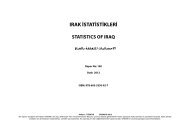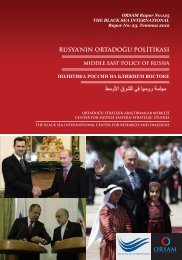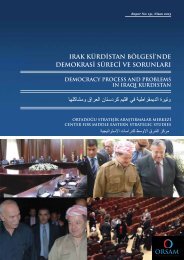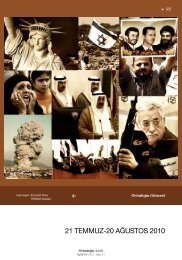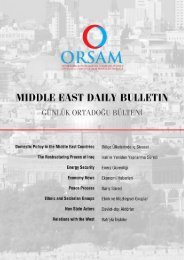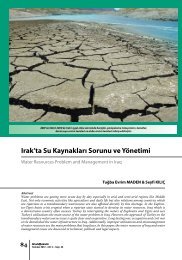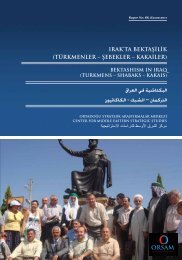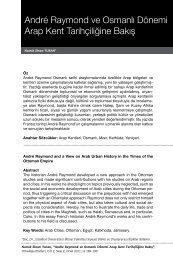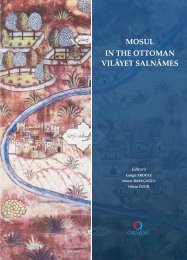turkmen in iraq and their flight - orsam
turkmen in iraq and their flight - orsam
turkmen in iraq and their flight - orsam
You also want an ePaper? Increase the reach of your titles
YUMPU automatically turns print PDFs into web optimized ePapers that Google loves.
TURKMEN IN IRAQ AND THEIR FLIGHT: A DEMOCRAPHIC QUESTION<br />
Environment of Human Insecurity <strong>in</strong> Iraq<br />
More than two decades now, politics <strong>and</strong> <strong>in</strong>ternational<br />
relations <strong>in</strong> Iraq have been determ<strong>in</strong>ed<br />
by wars <strong>and</strong> <strong>in</strong>ternal conflicts. This is the ma<strong>in</strong><br />
source of overall environment of human <strong>in</strong>security<br />
<strong>in</strong> the country. Perhaps we have to consider<br />
it with<strong>in</strong> the broader historical context of<br />
the Middle East, start<strong>in</strong>g with the 1948 War,<br />
which resulted <strong>in</strong> the displacement of 700,000<br />
Palest<strong>in</strong>ians 46 . However, overall environment<br />
of human <strong>in</strong>security refers not only such sudden<br />
displacements but a steady <strong>flight</strong> of people<br />
over a longer time period follow<strong>in</strong>g any such<br />
decisive clash. Russell was argu<strong>in</strong>g that <strong>in</strong>ternational<br />
relations <strong>and</strong> <strong>in</strong>ternational migration<br />
<strong>in</strong> the Middle East have not been the focus “<strong>in</strong><br />
Western analyses of developments <strong>in</strong> the region”,<br />
<strong>in</strong>deed, Iraq was virtually never mentioned.<br />
47 As we will see <strong>in</strong> the next chapter, this<br />
is not <strong>and</strong> cannot be the case anymore as Iraqi<br />
immigrants constitute a significant, sizeable<br />
diaspora community <strong>in</strong> European countries, as<br />
s<strong>in</strong>ce the Iraqi <strong>in</strong>vasion of Kuwait <strong>in</strong> 1991, the<br />
Iraqi <strong>in</strong>ternational migration regime shifted<br />
from ‘immigration’ to ‘emigration’. 48<br />
The chaotic post-war environment <strong>in</strong> Iraq <strong>and</strong><br />
the exist<strong>in</strong>g tensions among different ethnic<br />
groups are the central components of an Iraqi<br />
environment of human <strong>in</strong>security. EOHI, however,<br />
is not an entirely a new phenomenon <strong>in</strong><br />
Iraq. It has persisted for at least half a century,<br />
rooted <strong>in</strong> the Arabisation policies of Iraqi governments.<br />
49 This period commenced with the<br />
war between Iraq <strong>and</strong> Iran (1980-1988), cont<strong>in</strong>ued<br />
with the <strong>in</strong>vasion of Kuwait <strong>in</strong> 1991, <strong>and</strong><br />
the subsequent Gulf War. The United Nations’<br />
sanctions <strong>and</strong> embargo followed <strong>in</strong> August<br />
1990. The war <strong>in</strong> 2003 was, therefore, merely<br />
the last phase of wars <strong>in</strong> (<strong>and</strong> on) Iraq, as Iraq<br />
had been bombarded almost daily s<strong>in</strong>ce 1990. 50<br />
These ‘bombardments’ refer to the Shiite upris<strong>in</strong>g<br />
<strong>in</strong> 1991, Saddam’s bomb<strong>in</strong>gs of Northern<br />
Kurdish towns <strong>in</strong> 1991, <strong>and</strong> long lived clashes<br />
between two Kurdish parties (Kurdistan Patriotic<br />
Union <strong>and</strong> Kurdistan Democratic Party)<br />
<strong>in</strong> the North. These specific conflict situations,<br />
comb<strong>in</strong>ed with widespread poverty, the uneven<br />
distribution of wealth, <strong>and</strong> ongo<strong>in</strong>g human<br />
rights abuses <strong>in</strong> the country, were the contribut<strong>in</strong>g<br />
components to the Iraqi environment<br />
of <strong>in</strong>security, particularly dur<strong>in</strong>g the last two<br />
decades. 51<br />
In the wake of the attacks <strong>in</strong> 2003, some optimists<br />
were predicted a reconstruction which<br />
would be completed with<strong>in</strong> the follow<strong>in</strong>g decade.<br />
52 S<strong>in</strong>ce then we have a clear record that<br />
this is not the case, at least after seven years.<br />
Fight<strong>in</strong>g the war has proven to be far easier<br />
than fight<strong>in</strong>g the peace. 53 The past record of the<br />
USA’s unilateral, <strong>and</strong> I would argue, unjustified,<br />
operations, <strong>in</strong>dicates that adm<strong>in</strong>istrations built<br />
<strong>in</strong> such a unilateral way have not been successful,<br />
<strong>and</strong> that multilateral solutions take longer<br />
to be achieved. 54 Withdrawal of foreign troops<br />
<strong>and</strong> the establishment of function<strong>in</strong>g Iraqi governance<br />
are difficult to achieve <strong>in</strong> a short time<br />
span. This clearly illustrates that ‘rapid reconstruction’<br />
is a myth. This process of reconstruction<br />
may still ma<strong>in</strong>ta<strong>in</strong> long term <strong>in</strong>stability,<br />
<strong>and</strong> therefore encourage Iraqis to emigrate.<br />
As I expla<strong>in</strong>ed above the EOHI can be studied<br />
<strong>in</strong> two parts: material <strong>and</strong> non-material environment<br />
of human <strong>in</strong>securities. In response to<br />
such environment, one of the strategic options<br />
available to people is migration; to another secure<br />
area with<strong>in</strong> the country or <strong>in</strong> another country.<br />
To underst<strong>and</strong> the material environment of<br />
human <strong>in</strong>security <strong>in</strong> Iraq we can beg<strong>in</strong> with<br />
some basic <strong>in</strong>dicators. Health service provision<br />
<strong>in</strong> the country is very poor. About half of<br />
Iraqi doctors are believed to have left the country<br />
accord<strong>in</strong>g to World Health Organisation<br />
<strong>in</strong> the aftermath of the <strong>in</strong>vasion. Insurgencies<br />
have seen thous<strong>and</strong>s of physicians been murdered<br />
<strong>and</strong> kidnapped. By 2006, it was reported<br />
that about half of the civilian deaths could have<br />
been avoided <strong>in</strong> Iraq <strong>and</strong> easily treatable diseases<br />
such as diarrhoea <strong>and</strong> respiratory illness<br />
www.<strong>orsam</strong>.org.tr<br />
21




